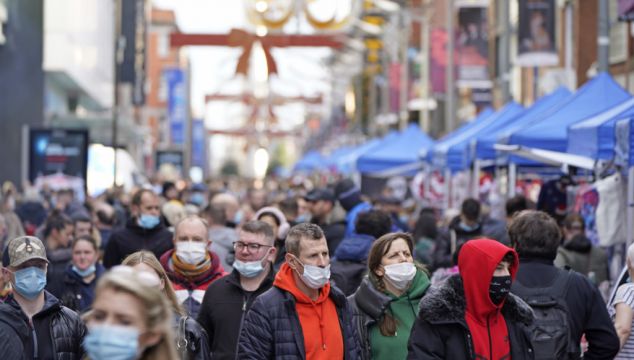The Omicron variant now makes up almost three quarters of Covid-19 infections in the Republic, the chief medical officer said, as a further 7,411 cases were confirmed on Thursday.
Almost one in four swabs tested yesterday detected the coronavirus.
The country's seven-day positivity rate is continuing to rise and is currently above 18 per cent for the first time since January, while 9,192 of the more than 37,000 swabs processed on Wednesday returned as positive.
Positive swabs do not always match confirmed cases, which have been verified to ensure people getting retested for Covid-19 are not counted twice.
Chief medical officer Dr Tony Holohan said today’s high number of cases “is not unexpected” amid the growth of the Omicron variant.
With Omicron now accounting for almost three quarters of cases in Ireland, today’s high number of confirmed cases of #COVID19 is not unexpected, and we expect to see a rapid increase in case figures over the coming short period of time.
Advertisement— Dr Tony Holohan (@CMOIreland) December 23, 2021
“With Omicron now accounting for almost three quarters of cases in Ireland... we expect to see a rapid increase in case figures over the coming short period of time,” he said.
“It is imperative that all of us, to the greatest extent possible, make every effort we can in the next two to three weeks to only meet with members of our own households.
“Consider your plans over the Christmas period and into the early part of the New Year and try to keep your contacts as low as possible.
"If someone in the household receives a 'detected' or 'positive' test result either via a PCR test or an antigen test, then all members of the household should restrict their movements and not attend work or socialise with others.”
Rising rates
Amid busy test centres, professor of immunology at Dublin City University (DCU) Christine Loscher said the country's positivity rate will likely continue rising.
“I think we are going to struggle in the coming days and weeks to try and record all case numbers,” she told Newstalk radio earlier on Thursday.
“I’m not surprised to see the figures have risen that quickly and I think it just points to everything we know about Omicron which is how transmissible it is - so despite the change in behaviour and all of the other restrictions that we have in place and public health guidelines, we can see that it’s really starting to have an impact.
“I would expect those numbers of positive swabs to keep increasing at that kind of pace over the next few days.”
The chief executive of the HSE warned on Thursday that Ireland could soon be recording 20,000 confirmed cases a day in a worst-case scenario, after the Omicron variant fully takes hold.
Paul Reid said that while hospital admission data showed Ireland was exiting the Delta wave, the recent acceleration of positive case numbers demonstrated the country was entering an Omicron wave.
The HSE has said it will have capacity to carry out 285,000 tests a week by mid-January.
Worst-affected areas
It comes as the capital has the highest 14-day incidence rate of Covid-19 in Ireland, with 1,777 cases per 100,000 people over the past fortnight.
Over these two weeks up to Tuesday, 37 per cent of the 65,000 infections across the country were located in Dublin.
Westmeath, Kildare and Louth were the next worst-affected areas.
On Thursday morning, there were a total of 390 people hospitalised with the virus, with 98 in intensive care - the first time this number has fallen below 100 since November 12th.
Almost half of Ireland’s adult population has now received a vaccine booster, the Taoiseach said on Thursday.







